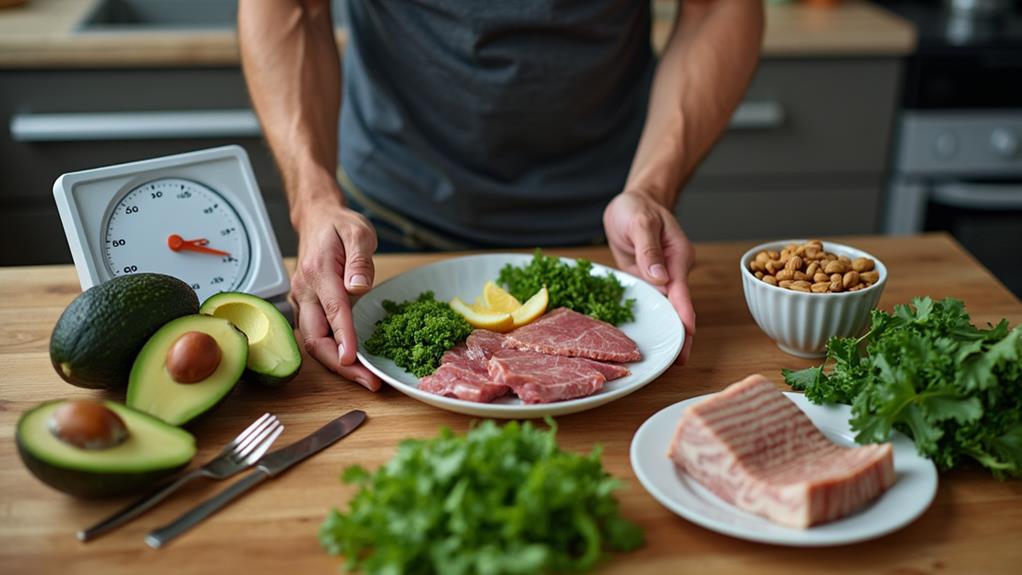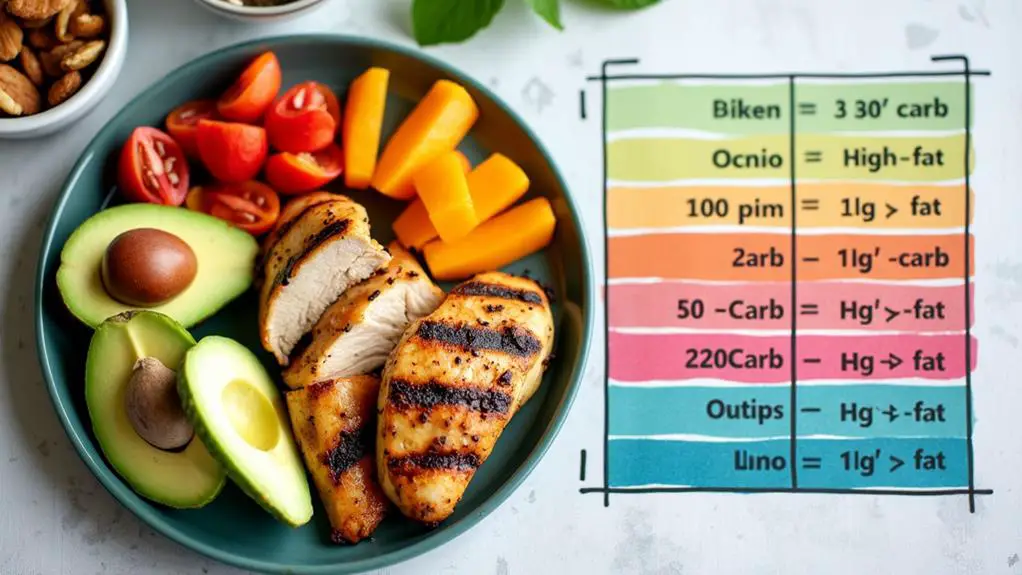
Males on a ketogenic diet should aim for a caloric intake of approximately 1,800 to 2,800 calories per day, influenced by factors such as age, weight, height, and activity level. The ketogenic diet typically comprises 70-75% fats, 15-20% proteins, and 5-10% carbohydrates. A moderately active male might require around 2,400-2,800 calories, while those aiming for weight loss might adjust to a caloric range of 1,800-2,200 daily. It's essential to monitor both caloric and macronutrient intake to meet individual health and weight management goals. Find out how other factors can affect your caloric needs and dietary success.
Key Takeaways
- Moderately active males on keto typically need 2,200-2,800 calories daily.
- For weight loss, a caloric intake of 1,800-2,200 calories is recommended.
- Caloric needs are influenced by age, weight, height, and activity level.
- Males should maintain a macronutrient ratio of 70-75% fats, 15-20% proteins, and 5-10% carbohydrates.
- Regularly reassess caloric intake based on Total Daily Energy Expenditure (TDEE) and weight management goals.
Understanding the Keto Diet
Understanding the keto diet requires a foundational grasp of its macronutrient composition and metabolic implications. The ketogenic diet, characterized by high-fat (70-75%), moderate-protein (15-20%), and very low-carbohydrate (5-10%) intake, aims to induce a state of ketosis.
In ketosis, the body shifts from utilizing glucose as its primary energy source to relying on fat and ketones produced in the liver. To achieve this, daily carbohydrate intake is typically restricted to 20-50 grams, ideally within 2-7 days. This metabolic switch also involves monitoring ketone levels to verify ketosis, using methods such as blood tests or urine strips.
Originally developed in the 1920s to treat epilepsy, the keto diet has gained popularity for its potential weight loss and health benefits, including improved blood sugar control and reduced inflammation. Commonly consumed foods include fatty cuts of meat, full-fat dairy products, avocados, nuts, seeds, and low-carb vegetables, while grains, sugars, and high-carb foods are largely avoided.
Despite its benefits, there are common diet misconceptions. Some believe the diet permits unlimited consumption of unhealthy fats or neglects nutrient balance.
However, a well-formulated ketogenic diet should emphasize whole foods and balanced nutrient intake to guarantee overall health and efficacy. Understanding these principles is essential for those considering this dietary approach.
Factors Influencing Caloric Needs
To optimize the benefits of a ketogenic diet, it is essential to assess the factors influencing caloric needs. Males typically require between 2,000 and 3,000 calories per day, with specific requirements varying based on age factors, weight considerations, and height impact. Younger males often have higher caloric needs due to higher metabolic rates, while older males may require fewer calories.
Weight and height also play notable roles; larger individuals generally necessitate more energy to maintain bodily functions and physical activities.
Metabolic variations are another important aspect to examine. Total Energy Expenditure (TEE) encompasses Basal Metabolic Rate (BMR) and physical activity, making it essential for determining individual caloric needs on a keto diet.
Lifestyle influences, such as activity level, considerably affect caloric requirements; more active males require higher caloric intake to sustain energy balance. A ketogenic diet can also help manage blood sugar levels, which can be particularly beneficial for those with type 2 diabetes.
Additionally, hormonal effects can impact metabolism and energy expenditure. For instance, testosterone levels can influence muscle mass and, consequently, caloric needs.
Dietary preferences and health conditions, such as diabetes or thyroid disorders, may also necessitate tailored caloric adjustments. As a result, a thorough evaluation of these factors is fundamental for optimizing caloric intake on a ketogenic diet.
Basal Metabolic Rate (BMR)
Basal Metabolic Rate (BMR) serves as a critical measure in determining the number of calories necessary for maintaining the body's essential physiological functions at rest. BMR calculations can be performed using the Mifflin-St. Jeor equation, specifically adapted for males: BMR = 10 × weight (kg) + 6.25 × height (cm) – 5 × age (years) + 5. This equation highlights the BMR significance by quantifying the caloric needs to sustain crucial bodily functions such as breathing and circulation.
BMR variations are influenced by several factors, including BMR and age, BMR and weight, BMR and height, and BMR and muscle mass. Generally, younger individuals and those with greater lean muscle mass possess a higher BMR. Conversely, as age increases, BMR tends to decrease due to a decline in muscle mass and metabolic activity.
Additionally, maintaining an adequate protein intake contributes to preserving muscle mass, which can positively impact BMR.
A common BMR misconception is the belief that it remains constant; however, BMR assessment must consider changes in body composition and health status. On average, a moderately active male may have a BMR ranging from 1,600 to 2,400 calories daily, contingent on individual characteristics.
Understanding BMR and health is paramount for tailoring dietary strategies, especially on a ketogenic diet, to meet specific caloric needs and achieve desired health outcomes.
Total Daily Energy Expenditure (TDEE)
Total Daily Energy Expenditure (TDEE) is an essential metric for determining caloric needs on a keto diet, as it encompasses both basal metabolic rate (BMR) and physical activity levels.
Calculating TDEE involves multiplying the BMR by an activity factor, which varies based on individual lifestyle and exercise habits.
For ideal weight management, particularly in moderately active males, understanding and adjusting TDEE guarantees appropriate caloric intake aligned with weight loss or maintenance goals.
Calculating Your TDEE
Calculating your Total Daily Energy Expenditure (TDEE) is an essential step in tailoring a ketogenic diet to meet your specific energy needs. TDEE calculation begins with estimating your Basal Metabolic Rate (BMR), which represents the number of calories your body requires at rest. The Mifflin-St. Jeor formula is often used for BMR estimation, incorporating factors such as age, weight, height, and sex.
Once the BMR is determined, it is multiplied by an activity factor to account for varying levels of physical activity. Activity factors range from 1.2 for sedentary individuals to 2.2 for those who are extremely active. This adjustment guarantees your TDEE reflects your daily energy expenditure accurately, aiding in effective weight management through appropriate dietary adjustments.
Key considerations in TDEE calculation include:
- BMR estimation: Utilize the Mifflin-St. Jeor formula for accurate baseline calculations.
- Activity factors: Adjust BMR using activity multipliers based on lifestyle.
- Calorie tracking: Monitor daily intake to align with TDEE for weight goals.
- Weight management: Create a caloric deficit for weight loss or balance for maintenance.
- Dietary adjustments: Regularly reassess TDEE to reflect changes in weight, activity, and body composition.
Accurate TDEE calculation allows for personalized dietary plans that optimize metabolic rate and overall health.
Adjusting for Activity**
Understanding how to adjust for activity levels is fundamental when calculating your Total Daily Energy Expenditure (TDEE), especially on a ketogenic diet. TDEE is derived by multiplying your Basal Metabolic Rate (BMR) by an activity factor, ranging from 1.2 for sedentary individuals to 2.2 for those who are extremely active. This calculation is essential for maintaining energy balance and ensuring appropriate calorie timing to support exercise intensity and various activity types.
For moderately active males, caloric needs typically range from 2,200 to 2,800 calories per day. Regular physical activity increases these requirements, necessitating adjustments to prevent energy deficits that could impair performance or muscle maintenance. Lifestyle factors, such as job type and leisure activities, also influence TDEE and must be considered when tailoring a ketogenic diet.
To promote weight loss, a caloric deficit of 500 to 750 calories from TDEE is recommended, aiming for a sustainable weight loss rate of 1 to 1.5 pounds per week. Regular reassessment of TDEE is crucial, as changes in weight and activity levels affect caloric needs. Additionally, hydration needs should be monitored to support overall health and physical performance.
| Activity Level | Activity Factor | Estimated Caloric Needs (kcal) |
|---|---|---|
| Sedentary | 1.2 | 2,200 – 2,500 |
| Moderately Active | 1.55 | 2,400 – 2,800 |
| Very Active | 1.9 | 2,600 – 3,200 |
Typical Caloric Range for Males

Moderately active males typically require between 2,200 and 2,800 calories per day to maintain their current weight, though this range can be adjusted based on individual activity levels and specific weight goals.
For males following a ketogenic diet, understanding their caloric requirements is vital to guarantee they meet their dietary preferences and health objectives. Significantly, the keto diet promotes weight loss by utilizing fat for energy through ketosis, which can lead to rapid fat loss and improved body composition. The Atkins 20 Diet, for example, recommends a caloric intake of 1,800 to 2,200 calories for men on a keto regimen.
It is essential to reflect on the following factors when determining the appropriate caloric range:
- Macronutrient Distribution: Aim for 70-75% fats, 15-20% proteins, and 5-10% carbohydrates.
- Activity Level: More active individuals may need to adjust their caloric intake upwards.
- Age and Size: Older individuals or those with smaller body frames may require fewer calories.
- Lifestyle: Sedentary lifestyles necessitate lower caloric intake compared to active ones.
- Personal Goals: Caloric needs differ if the goal is maintenance, muscle gain, or fat loss.
Personalizing caloric intake based on these considerations guarantees that dietary preferences and health goals are met effectively, fostering better adherence to the ketogenic diet.
Adjusting Calories for Weight Loss
To achieve effective weight loss on a keto diet, it is essential to maintain a caloric deficit of approximately 500-750 calories per day relative to one's Total Daily Energy Expenditure (TDEE).
This can be facilitated by ketosis, which lowers ghrelin levels, the hunger hormone, leading to decreased appetite.
Balancing macronutrients within the ketogenic ratios of 70-75% fats, 15-20% proteins, and 5-10% carbohydrates is vital to guarantee nutritional adequacy while reducing caloric intake to 1,800-2,200 calories for males.
Regularly monitoring weight and dietary habits every 3-4 weeks can help identify the need for caloric adjustments to sustain weight loss progress.
Caloric Deficit Importance
Achieving effective weight loss on a ketogenic diet fundamentally hinges on maintaining a caloric deficit, typically between 500-750 calories per day. This approach leads to a sustainable weight loss of approximately 1 to 1.5 pounds per week.
For moderately active males, this generally translates to a daily caloric intake ranging from 1,800 to 2,200 calories, contingent upon factors such as age and activity level.
To guarantee sustainable weight loss, employing sound caloric deficit strategies is vital. These strategies can help maintain a consistent caloric deficit without compromising overall nutritional needs:
- Monitor daily caloric burn: Confirm that caloric consumption is less than the calories expended.
- Utilize portion control: Even keto-friendly foods can be calorie-dense, so appropriate portion sizes are essential.
- Leverage keto's appetite suppression: The ketogenic diet naturally reduces hunger, aiding in adherence to lower caloric intakes.
- Track food intake meticulously: Keeping a detailed food diary can help identify areas where caloric intake can be adjusted.
- Focus on nutrient-dense foods: Prioritize foods that provide essential nutrients while maintaining a caloric deficit.
Balancing Macros Effectively**
Balancing macronutrients effectively on a ketogenic diet is vital to achieving and maintaining weight loss. Males typically require a caloric intake of 1,800 to 2,200 calories per day, depending on their activity level and metabolic rate. To achieve a healthy weight loss of 1 to 1.5 pounds per week, a caloric deficit of 500-750 calories is recommended.
The ideal macronutrient ratio for a ketogenic diet consists of approximately 70-75% fats, 20-25% proteins, and 5-10% carbohydrates.
Monitoring portion sizes, especially of high-calorie foods like nuts and cheese, is important. Overconsumption can easily lead to exceeding daily caloric limits, hindering weight loss progress. Incorporating keto snack options such as avocado slices, boiled eggs, and vegetable sticks with guacamole can aid in portion control and prevent unplanned calorie intake.
Effective meal prep strategies are also necessary. Planning meals in advance guarantees adherence to the macronutrient ratio and caloric goals.
Adjusting caloric intake periodically based on individual progress and activity levels is essential. Males should reassess their caloric needs every few weeks to guarantee continuous weight loss. This strategy enables fine-tuning of both macro and caloric intake for ideal results on a ketogenic diet.
Adjusting Calories for Maintenance

Adjusting caloric intake for maintenance on a ketogenic diet requires a meticulous understanding of one's Total Energy Expenditure (TEE). To accurately determine TEE, males must calculate their Basal Metabolic Rate (BMR) and multiply it by an activity factor, ranging from 1.2 for sedentary to 2.2 for extremely active lifestyles. This helps establish the baseline caloric needs, which generally range from 2,200 to 2,800 calories per day for moderately active males.
Regularly review and adjust macro targets based on tracking data to guarantee they align with changing activity levels and goals.
To maintain weight, careful attention must be paid to caloric cycling and portion control. Caloric cycling involves varying daily caloric intake to match fluctuations in activity levels, thereby avoiding a constant caloric surplus or deficit. Portion control is equally essential, as even keto-friendly, high-calorie foods can lead to unintentional weight gain if consumed in excess.
Key considerations include:
- Regularly reassessing dietary habits and energy levels.
- Confirming macronutrient ratios align with ketogenic principles: 70-75% fats, 15-20% proteins, and 5-10% carbohydrates.
- Monitoring total caloric intake to prevent excess consumption.
- Adjusting portions to maintain balance between caloric intake and expenditure.
- Utilizing tools such as food journals or apps to track daily intake accurately.
These strategies collectively support effective caloric management for weight maintenance on a ketogenic diet.
Impact of Activity Level
Activity level greatly influences caloric needs on a keto diet, with active individuals generally requiring more calories to sustain their energy expenditure.
For example, moderately active males may need up to 2,200 calories per day, compared to their sedentary counterparts who might need around 1,800 calories.
Accurate caloric adjustment based on activity levels is essential for maintaining weight, supporting muscle gain, and ensuring overall metabolic health.
Additionally, meal preparation and planning can help manage caloric intake efficiently, ensuring that the diet aligns with one's activity level and goals.
Caloric Needs Calculation
Understanding caloric needs is vital for anyone following a keto diet, particularly when considering the impact of activity level. Caloric needs can vary considerably based on how active an individual is, and adhering to keto guidelines requires careful calculation.
Moderately active men typically need between 2,200 and 2,800 calories daily to maintain their weight. This range can be adjusted using the Total Energy Expenditure (TEE) formula, which multiplies the Basal Metabolic Rate (BMR) by an activity factor.
The activity factor ranges are as follows:
- Sedentary: Activity factor of 1.2
- Lightly active: Activity factor of 1.375
- Moderately active: Activity factor of 1.55
- Very active: Activity factor of 1.725
- Extremely active: Activity factor of 2.0 to 2.2
For weight loss on a keto diet, a daily caloric deficit of 500-750 calories is generally recommended, equating to a loss of about 1-1.5 pounds per week.
An increase in physical activity can raise TEE, permitting a higher caloric intake while still achieving a caloric deficit. Monitoring and adjusting caloric intake are essential, as individual needs can vary due to factors such as age, size, and health status.
Adjusting for Activity
One's activity level plays an essential role in determining the appropriate caloric intake on a keto diet. Moderately active men typically require between 2,200 and 2,800 calories per day for maintenance. For effective weight loss, it is recommended to create an energy deficit of 500 to 750 calories from their Total Energy Expenditure (TEE). This necessitates careful keto meal planning tailored to individual activity levels.
Sedentary men might need to consume fewer calories, around 2,000 to 2,400 per day, whereas highly active individuals may need to increase their caloric intake to sustain energy levels. Light exercise types, such as walking or yoga, might lead to a caloric requirement of approximately 2,200 calories per day. Conversely, intense exercise types, like high-intensity interval training (HIIT) or heavy weightlifting, could necessitate upwards of 2,800 calories daily.
Regular assessment of one's activity levels and corresponding caloric needs is critical for men on a keto diet. This guarantees they maintain energy balance and support their weight management goals.
Accurate adjustments in caloric intake based on activity level can optimize the effectiveness of the ketogenic diet, enhancing both physical performance and overall health.
Macronutrient Ratios on Keto

Adopting a ketogenic diet involves meticulously balancing macronutrient ratios to achieve and maintain a state of ketosis, where the body primarily burns fat for energy.
For males, the typical macronutrient ratio is approximately 70-75% fats, 20-25% proteins, and 5-10% carbohydrates. This equates to about 140-150 grams of fat, 100-125 grams of protein, and 20-50 grams of carbohydrates daily on a 2,000-calorie diet.
Studies have shown that maintaining these macronutrient ratios can lead to significant weight loss and improved blood sugar levels. Emphasizing ideal fat sources is vital. These include:
- Avocados
- Olive oil
- Nuts
- Seeds
- Fatty fish
Protein moderation is equally important, as excessive protein intake can convert to glucose and potentially disrupt ketosis. Aiming for around 1.2-1.7 grams of protein per kilogram of body weight is advisable.
This guarantees adequate muscle maintenance and overall body function without jeopardizing ketosis. Additionally, incorporating low-carb vegetables such as leafy greens and broccoli can provide essential nutrients while keeping carbohydrate intake within the prescribed limits.
Monitoring Caloric Intake
While achieving the correct macronutrient ratios is fundamental to entering and maintaining ketosis, monitoring caloric intake plays a significant role in optimizing the ketogenic diet for weight loss and overall health. Caloric tracking is essential because overconsumption of calorie-dense foods like nuts and cheese can hinder weight loss efforts. Although the ketogenic diet typically does not necessitate strict calorie counting, maintaining dietary awareness by being cognizant of daily caloric intake can help identify stalls in weight loss or unwanted weight gain.
A recommended calorie deficit of 500-750 calories per day can lead to effective weight loss, equating to approximately 1-1.5 pounds per week. Continuously tracking macronutrient ratios—ideally 70-75% fats, 15-20% proteins, and 5-10% carbohydrates—can assist in maintaining ketosis while monitoring overall caloric intake.
| Macronutrient | Ideal Percentage | Importance |
|---|---|---|
| Fats | 70-75% | Maintains ketosis |
| Proteins | 15-20% | Supports muscle maintenance |
| Carbohydrates | 5-10% | Limits glucose, supports ketosis |
Regular assessments of dietary habits and caloric consumption are integral to ensuring adherence to weight loss goals and maintaining nutritional balance within the keto framework. Utilizing these strategies can enhance the effectiveness of the ketogenic diet and support long-term health objectives.
Common Challenges and Tips

Steering through the ketogenic diet often involves overcoming several common challenges that can impede progress. Males on a keto diet, who typically require between 1,800 to 2,200 calories per day for weight loss, must navigate various obstacles to achieve their goals effectively.
Understanding keto basics can provide a strong foundation for success, including the importance of macronutrient ratios and familiarizing oneself with common keto foods.
One prominent challenge is dealing with keto cravings. Effective meal planning and selecting appropriate snack options can help maintain caloric balance and prevent overeating. Monitoring food intake through food tracking is necessary to avoid the high calorie-density of many keto-friendly foods.
Social situations and dining out can also present difficulties; in such cases, opting for recipe swaps and practicing portion control are essential strategies.
To alleviate early symptoms of the keto flu, staying hydrated and incorporating hydration strategies to replenish electrolytes is significant. Additionally, maintaining satiety with high-fiber, low-carb vegetables can help adhere to caloric guidelines and support sustained weight loss.
Here are some tips to overcome these challenges:
- Meal planning: Prepare and plan meals to avoid impulsive eating.
- Snack options: Choose low-carb, nutrient-dense snacks.
- Food tracking: Regularly monitor caloric intake.
- Hydration strategies: Guarantee adequate fluid and electrolyte intake.
- Recipe swaps: Adapt traditional recipes to fit keto guidelines.
Frequently Asked Questions
Is 1500 Calories a Day Ok on Keto?
A daily intake of 1,500 calories on keto meal plans can be appropriate for weight loss in some men, provided they engage in calorie tracking and guarantee their nutritional needs through proper macronutrient ratios and balanced food selections.
Is 800 Calories Enough on Keto?
Consuming 800 calories on a ketogenic diet is insufficient for most males, leading to keto hunger and potential metabolic adaptation. Such a restrictive intake can cause nutrient deficiencies, muscle loss, and hinder sustainable weight management.
Should I Limit My Calories on Keto?
Yes, limiting calories on keto is essential to avoid a caloric surplus, which can hinder weight loss. Monitoring intake helps prevent metabolic adaptation, ensuring steady progress toward weight loss or maintenance goals within the ketogenic diet framework.
How Many Calories Is Keto Friendly?
A keto-friendly caloric intake varies by individual but generally falls between 1,800 to 2,200 calories for men. Emphasis should be placed on keto food choices and maintaining a proper macronutrient balance to achieve dietary goals effectively.
Conclusion
In summary, determining the appropriate caloric intake for males on a keto diet requires consideration of various factors, including Basal Metabolic Rate (BMR), Total Daily Energy Expenditure (TDEE), and activity levels. A typical caloric range can vary greatly based on individual needs and goals. Adhering to proper macronutrient ratios and monitoring caloric intake are essential for achieving desired outcomes. Addressing common challenges through evidence-based strategies can enhance the effectiveness of the keto diet for males.










No Comments